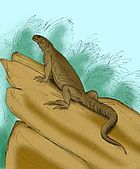Suzanniwana
| Suzanniwana Temporal range: Early Eocene,
| |
|---|---|
| Scientific classification | |
| Domain: | Eukaryota |
| Kingdom: | Animalia |
| Phylum: | Chordata |
| Class: | Reptilia |
| Order: | Squamata |
| Suborder: | Iguania |
| Clade: | Pleurodonta |
| Genus: | †Suzanniwana Smith, 2009 |
| Species | |
|
†S. patriciana Smith, 2009 (type) | |
Suzanniwana is an extinct genus of iguanian lizards that lived in western North America during the earliest Eocene, approximately 56 million years ago. Two species are known from the Bighorn Basin of Wyoming: the type species S. patriciana named in 2009, and the species S. revenanta named in 2013.[1] Suzanniwana lived during the Paleocene–Eocene Thermal Maximum, a brief period of global warming that resulted in warmer and drier conditions in the Bighorn Basin.[2] It likely stemmed from a lineage that had migrated into the basin from regions farther to the south, following a latitudinal band of constant climatic conditions that moved northward as the planet warmed (a phenomenon known as habitat tracking).[3] Suzanniwana shares many skeletal features with modern casquehead lizards of the family Corytophanidae and may be a stem-corytophanid. It also closely resembles Geiseltaliellus, an iguanian from the middle Eocene Messel pit in Germany.[3][4]
References
- ^ Smith, Krister T.; Gauthier, Jacques A. (2013). "Early Eocene Lizards of the Wasatch Formation near Bitter Creek, Wyoming: Diversity and Paleoenvironment during an Interval of Global Warming". Bulletin of the Peabody Museum of Natural History. 54 (2): 135. doi:10.3374/014.054.0205.
- ^ Kunzig, R. (October 2011). "World Without Ice". National Geographic: 90–109.
- ^ a b Smith, Krister T. (2009). "A new lizard assemblage from the earliest eocene (Zone Wa0) of the bighorn basin, wyoming, USA: Biogeography during the warmest interval of the cenozoic". Journal of Systematic Palaeontology. 7 (3): 299. doi:10.1017/S1477201909002752.
- ^ Smith, Krister T.; Wuttke, Michael (2012). "From tree to shining sea: Taphonomy of the arboreal lizard Geiseltaliellus maarius from Messel, Germany". Palaeobiodiversity and Palaeoenvironments. 92: 45. doi:10.1007/s12549-011-0064-2.





